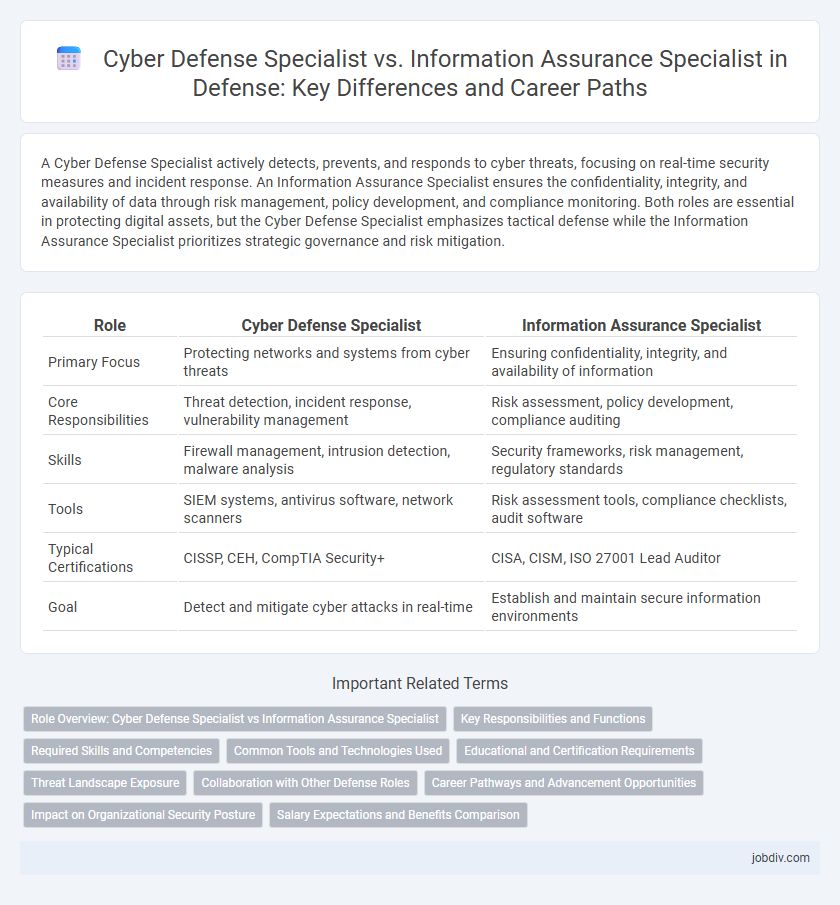A Cyber Defense Specialist actively detects, prevents, and responds to cyber threats, focusing on real-time security measures and incident response. An Information Assurance Specialist ensures the confidentiality, integrity, and availability of data through risk management, policy development, and compliance monitoring. Both roles are essential in protecting digital assets, but the Cyber Defense Specialist emphasizes tactical defense while the Information Assurance Specialist prioritizes strategic governance and risk mitigation.
Table of Comparison
| Role | Cyber Defense Specialist | Information Assurance Specialist |
|---|---|---|
| Primary Focus | Protecting networks and systems from cyber threats | Ensuring confidentiality, integrity, and availability of information |
| Core Responsibilities | Threat detection, incident response, vulnerability management | Risk assessment, policy development, compliance auditing |
| Skills | Firewall management, intrusion detection, malware analysis | Security frameworks, risk management, regulatory standards |
| Tools | SIEM systems, antivirus software, network scanners | Risk assessment tools, compliance checklists, audit software |
| Typical Certifications | CISSP, CEH, CompTIA Security+ | CISA, CISM, ISO 27001 Lead Auditor |
| Goal | Detect and mitigate cyber attacks in real-time | Establish and maintain secure information environments |
Role Overview: Cyber Defense Specialist vs Information Assurance Specialist
Cyber Defense Specialists focus on detecting, analyzing, and mitigating cyber threats to protect networks and systems from attacks, employing tools like intrusion detection systems and threat intelligence platforms. Information Assurance Specialists ensure the integrity, availability, confidentiality, and authenticity of data by implementing security policies, risk assessments, and compliance with regulations such as NIST and FISMA. Both roles are critical in defense strategies, with Cyber Defense Specialists handling active threat response and Information Assurance Specialists maintaining robust security frameworks.
Key Responsibilities and Functions
A Cyber Defense Specialist focuses on identifying, mitigating, and responding to cyber threats through real-time monitoring, intrusion detection, and incident response protocols. An Information Assurance Specialist ensures the confidentiality, integrity, and availability of critical data by developing security policies, conducting risk assessments, and implementing compliance measures. Both roles are essential for maintaining cybersecurity posture, but Cyber Defense Specialists emphasize active threat neutralization while Information Assurance Specialists concentrate on protective frameworks and regulatory adherence.
Required Skills and Competencies
Cyber Defense Specialists require advanced skills in threat detection, network security protocols, and incident response to safeguard military systems from cyberattacks. Information Assurance Specialists focus on risk assessment, data integrity, and compliance with cybersecurity regulations, ensuring secure information handling and system reliability. Both roles demand proficiency in encryption techniques, vulnerability management, and knowledge of Defense Department cybersecurity frameworks such as DoD Directive 8140.
Common Tools and Technologies Used
Cyber Defense Specialists utilize advanced intrusion detection systems (IDS), Security Information and Event Management (SIEM) platforms, and endpoint protection technologies to monitor and mitigate cyber threats in real-time. Information Assurance Specialists rely on risk assessment tools, encryption software, and compliance management systems to ensure data integrity, confidentiality, and availability across information systems. Both roles frequently employ vulnerability scanners, firewalls, and secure communication protocols to maintain robust cybersecurity posture within defense environments.
Educational and Certification Requirements
Cyber Defense Specialists typically require a bachelor's degree in computer science, cybersecurity, or information technology, accompanied by certifications such as Certified Information Systems Security Professional (CISSP) or Certified Ethical Hacker (CEH). Information Assurance Specialists often hold degrees in information assurance, cybersecurity, or related fields and prioritize certifications like Certified Information Security Manager (CISM) or CompTIA Security+. Both roles demand continuous education to stay updated on evolving cyber threats and defense strategies.
Threat Landscape Exposure
Cyber Defense Specialists actively monitor and respond to real-time cyber threats, utilizing advanced intrusion detection systems and threat intelligence to mitigate attacks on critical infrastructure. Information Assurance Specialists concentrate on creating and enforcing policies, risk assessments, and compliance frameworks to safeguard data integrity and confidentiality across defense networks. The rapidly evolving threat landscape exposes Cyber Defense Specialists to persistent tactical cyberattacks, while Information Assurance Specialists face strategic risks related to regulatory changes and long-term data protection challenges.
Collaboration with Other Defense Roles
Cyber Defense Specialists coordinate closely with network security teams and incident response units to identify and mitigate cyber threats in real time. Information Assurance Specialists collaborate with risk management and compliance officers to ensure the integrity, confidentiality, and availability of critical defense information systems. Their joint efforts enhance the overall cybersecurity posture by integrating threat detection with robust policy enforcement across defense operations.
Career Pathways and Advancement Opportunities
Cyber Defense Specialists typically advance by gaining expertise in threat detection, incident response, and penetration testing, often progressing to roles such as cybersecurity analysts or security architects. Information Assurance Specialists focus on risk management, compliance, and policy implementation, with career trajectories leading to positions like compliance officers or chief information security officers (CISOs). Both pathways offer certifications like CISSP and CISM, which are critical for advancement and leadership roles within the defense sector.
Impact on Organizational Security Posture
Cyber Defense Specialists enhance organizational security posture by proactively identifying and mitigating cyber threats through real-time threat intelligence and incident response strategies. Information Assurance Specialists strengthen this posture by ensuring the confidentiality, integrity, and availability of data through comprehensive risk management, compliance adherence, and policy development. Together, these roles create a layered defense strategy that significantly reduces vulnerabilities and enhances resilience against cyberattacks.
Salary Expectations and Benefits Comparison
Cyber Defense Specialists typically command higher salaries due to their expertise in identifying and mitigating cyber threats, with average annual earnings ranging from $90,000 to $130,000 depending on experience and certifications. Information Assurance Specialists earn between $75,000 and $110,000, focusing on risk management, compliance, and safeguarding data integrity. Both roles offer benefits such as health insurance, retirement plans, and continuous training opportunities, but Cyber Defense positions often include additional incentives like hazard pay and specialized bonuses linked to threat response performance.
Cyber Defense Specialist vs Information Assurance Specialist Infographic

 jobdiv.com
jobdiv.com